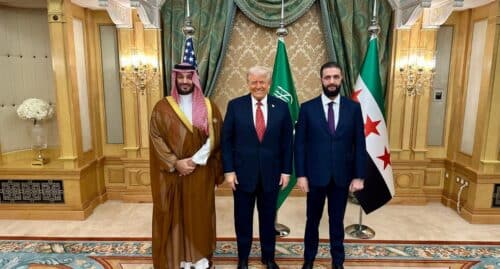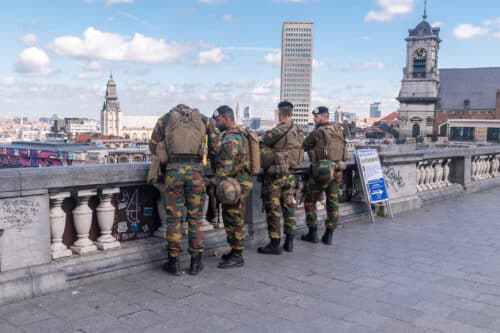On September 11th, Defense Minister Yoav Gallant unveiled photographs depicting an Iranian airfield situated in Southern Lebanon, a mere 20 kilometers away from Israel. Gallant asserted that the purpose of this airfield was linked to terrorism. He drew attention to the presence of Iranian flags in the images and emphasized that while the land belonged to Lebanon, control of the airfield rested with the Iranians. According to an anonymous source cited by “Reuters” news agency, this airport has the capacity to accommodate large Unmanned Aerial Vehicles (UAVs), some of which are armed with Iranian-designed weaponry. The source further indicated that aircraft taking off from this location could be employed for both domestic and external operational activities.
This comes amid ongoing tensions in northern Israel involving Hezbollah. Since the start of 2023, Hezbollah has been repeatedly provoking Israel. On March 13th, a Lebanese terrorist, possibly acting on behalf of or with Hezbollah’s knowledge, detonated a claymore -type roadside bomb near the Megiddo junction. This resulted in a severe injury to a civilian. On April 6, Hamas operatives based in Lebanon fired 34 rockets into the Western Galilee, along with rocket launchers targeting Metula, with indications of at least tacit approval from Hezbollah. Even if Hezbollah did not directly orchestrate or endorse these operations, it is reasonable to assume, even plausible, that they were aware of them, given their substantial control over southern Lebanon.
On July 6, an anti-tank missile was launched toward Israeli territory, prompting an IDF response with artillery fire targeting the launch site. On June 21, Hezbollah erected two tents with armed operatives on Israeli sovereign soil, and made repeated attempts to breach the border fence. For instance, on July 12, Hezbollah operatives tried to sabotage the border fence and were repelled by the IDF using stun grenades, resulting in injuries to three Hezbollah members. On the same day, Hezbollah also attacked surveillance cameras around the Fatma gate near Metula, even stealing one. These incidents were compounded by numerous clashes and breaches of the blue line by individuals posing as “farmers” and “refugees.”
Hezbollah’s increased boldness appears to stem from the steady erosion of Israeli deterrence. Initially, Israel was tempted to sign a maritime border agreement with Lebanon on October 27, 2022, in response to threats from Hezbollah to take military action if Israel began gas production from the “Karish” reservoir without signing the agreement with Lebanon accepting all the original Lebanese\Hezbollah demands. Simultaneously, on July 2, 2022, Hezbollah dispatched three drones toward an Israeli gas rig. Approving the agreement while Hezbollah was issuing threats proved to be a misstep. These threats and actions by Hezbollah bolstered its influence within Lebanon, even among those who opposed the terrorist organization. In Lebanon, it was argued that the “opposition” had sway over Israel’s decision to endorse the agreement, portraying Israel as capitulating to Hezbollah’s threats. Not only that, the Israeli government openly justified its decision to sign the agreement by citing a desire to avert a wide conflict with Hezbollah.
Moreover, Israel failed to respond to most of Hezbollah’s provocations over the past year, including the positioning of the two tents on Israeli sovereign territory. This Israeli restraint further weakened deterrence against Hezbollah, emboldening the organization.
The extension of UNIFIL’s mandate by the UN Security Council
Meanwhile, the UN Security Council’s resolution on August 31, 2023, to extend the mandate of the UN Force in Lebanon (UNIFIL) was presented as a significant political and diplomatic accomplishment for Israel. This was highlighted by the inclusion of a provision in the agreement granting UN peacekeeping forces in Lebanon unrestricted freedom of movement throughout southern Lebanon, not limited to just the border region with Israel. Moreover, they were allowed to act independently, giving UNIFIL the ability to carry out surprise patrols across all of southern Lebanon, a departure from the previous situation.
Nevertheless, it is crucial to temper Israeli enthusiasm. The decision includes a vague reference to UNIFIL’s need to coordinate with the Lebanese army, even if independent patrols are permitted. This presents a weak pretext for the Lebanese army and Hezbollah to obstruct UNIFIL patrols.
Looking beyond the resolution’s wording, it is unrealistic to believe that the UN would act efficiently against Hezbollah’s interests. It should not be assumed that peacekeeping forces would carry out Israel’s objectives in southern Lebanon. Historical evidence has shown that UN peacekeeping forces often falter when faced with critical situations. Despite UNIFIL being granted the authority to prevent arms smuggling to southern Lebanon, there has not been a single instance of successful intervention since its inception. UNIFIL has been stationed in southern Lebanon since 1978, yet Hezbollah has continued to strengthen and amass over 150,000 rockets and missiles. This only reaffirms to Israel its longstanding policy, that it cannot rely on external forces for its security. It is crucial to underscore that the UN force has never effectively prevented hostile activities against Israel in any arena.
Cease the strategy of Containment in Lebanon
Currently, Israel has no inclination to escalate tensions in the northern region and engage in a wide military conflict with Hezbollah in Lebanon. Not only is it Israel’s traditional policy, of averting or procrastinating war, Israel faces more pressing political and security challenges, including addressing internal divisions within its society, fostering closer ties with Saudi Arabia while expanding the Abraham Accords, and, notably, countering the Iranian threat, which includes a secretive nuclear understanding, albeit informal, between the United States and Iran.
Nonetheless, Israel must bolster its deterrence against Hezbollah. Therefore, Israel should transition from a strategy of containment in Lebanon to a strategy that aims at gradual and controlled escalation. In the initial phase, Israel needs to adopt an approach that involves measures short of war, akin to Israel’s Campaign Between the Wars (CBW) conducted in Syria and other parts of the Middle East. Israeli military actions in Lebanon should be implemented incrementally, targeting “low-value” objectives before progressing to more strategically significant ones, all while maintaining a high degree of ambiguity and plausible deniability.
Covert military operations serve to diminish the likelihood of a retaliatory response from Hezbollah, especially in the case of undisclosed Israeli strikes against secondary Hezbollah targets. This, in turn, fosters the potential for Hezbollah to become acclimated to this new dynamic, potentially lulling the terrorist organization into a state of complacency. Imposing this altered equation on Hezbollah incrementally will, over time, erode the capabilities of the Shi’ite terrorist group and fortify Israeli deterrence.
It can reasonably be assumed that Hezbollah currently does not desire a war with Israel for several compelling reasons on top of the Israeli deterrence itself, which is still significant even after it was eroded. Hezbollah’s primary focus at present lies within Lebanon’s domestic sphere, primarily driven by the severe political and economic turmoil engulfing the country. Within the Shi’ite organization, considerable efforts are underway to endorse a presidential candidate in Lebanon aligned with the Shi’ite camp, which enjoys Iran’s support. This endeavor involves prominent global players such as France and the United States, as well as regional powerhouses such as Saudi Arabia. Hezbollah would likely want to avoid appearing as an obstacle to national reconciliation efforts in Lebanon.
Furthermore, Hezbollah has presented the signing of the maritime border agreement with Israel as its own achievement without resorting to war. Recently, energy companies have initiated exploration activities for gas in Lebanon’s economic waters, and Hezbollah probably would not wish to be held responsible for undermining Lebanon’s economy and stability during a period of profound economic and political crisis.
Nonetheless, the proposed strategy carries the inherent risk of military escalation and this must be taken into consideration. Israel should proactively prepare for the potential occurrence of a limited military operation lasting several days. In such a scenario, Israel could leverage the escalation to inflict significant damage upon Hezbollah’s military capabilities. The target bank might, among other things, include the organization’s missile stockpiles, including its facilities and silos, command and control centers, and military infrastructure, particularly in southern Lebanon.
Without readiness to escalate, Israeli deterrence will continue to erode. Consequently, Israel should also make preparations for a war with Hezbollah. These military preparations should be complemented by the enhancement of defensive capabilities against missile barrages originating from Lebanon.
The views expressed in this article are those of the author and do not necessarily represent the views of the movement






